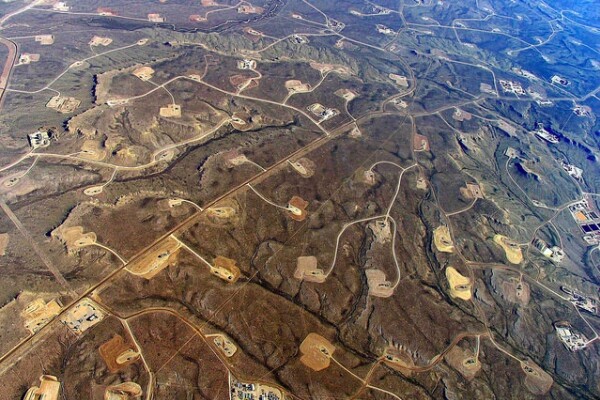Our Food Is Not Being Grown With Fracking Wastewater

As far as panic-inducing headlines go, it's tough to get much more frightening than "There Might Be Fracking Wastewater In Your Organic Fruits and Veggies." Let's break it down: Our organic(!) fruits and veggies are being contaminated by wastewater(!) coming from the diabolic act of fracking(!). A trifecta of trigger points! But there's another word in that headline that needs further examination: Might.
So, just how big of a problem is the use of fracking wastewater in agriculture irrigation? That's where things get pretty murky.
Let's start with a quick primer on fracking. It's a relatively new method for getting oil and gas from shale rock. It works by drilling deep holes into the ground and injecting a high-pressure water mixture into the rock, allowing gas from the shale to flow up to the well where it's collected. The method is pretty controversial, since it uses a heck of a lot of water and there's a not-insignificant potential for contaminating groundwater near the fracking site.
But what's important to this discussion is what happens to the water after it's used. In May, the Los Angeles Times reported that a lot of the water produced by oil and gas production in the Central Valley ends up being resold to farmers who then use it on crops. The worries are obvious, since that water can end up containing acetone, and oil, and other metals that aren't good to have in your food.
Partially in response to the news, California state assembly person Mike Gallo, a Democrat from Burbank, sponsored a bill that would require food grown with oil and gas wastewater to be labeled. This, ostensibly, would give consumers a choice when purchasing their goods -- between purchasing food grown with clean water, and food grown with disgusting water, which isn't much of a choice at all -- and force the industry to make a change through the free market. (If they want to stay in business, they better find a way to forgo using wastewater.)
However.
"Fracking water is not reused," said Blake Sanden of the University of California's Agriculture and Natural Resources program. "It's injected back into the oil bearing strata far below where agricultural groundwater pumping occurs."
At least, that's what the law states. A series of investigations in West Virginia and Pennsylvania tried to track the water used in fracking from start to finish, and mostly couldn't. In some cases, the water was discharged in rivers and streams, which is worrying because the wastewater from those states is particularly full of nasty materials. (It's not as bad in California.) However, improper disposal methods for wastewater is a far cry from selling it to farmers to be used on their crops.
So, just how big of a worry is it truly? Sanden points me in the direction of Bakersfield Californian writer Lois Henry, who's been writing a series about wastewater irrigating crops in the Central Valley. Her articles, Sanden tells me, are "a good counterpoint to the misinformation published in the L.A. Times." In one of her latest op-eds, Henry runs through a litany of what's wrong with Gallo's proposed bill, starting with the fact that fracking wastewater isn't used to irrigate crops.
Nearly as important, though, is the fact that the bill would require all food irrigated by oilfield-produced water to be labeled. Here's where things get tricky. See, there is oilfield-produced water being used to irrigate crops in Kern County. But before it gets there, it's treated and mixed with fresh water, a method that's been tested by outside parties and declared to be safe.
Still! Using water from an oilfield to grow food seems weird and creepy, right? But is it something to fear?
"If you use wastewater like that over many years, and if there were compounds in it such as organics or elements like metals, then those compounds could build up in the soil,"said Rob Jackson, a professor of Earth System Science from Stanford. "That's where you could start to have some problems."
It's all about the long-term usage. Perhaps the first harvest or two from the wastewater wouldn't have negative effects, but if that water's continually used, who knows. "If a little bit of it is spread around across a big area," said Jackson, "that to me is less of a concern than using wastewater to irrigate a field over and over and over again over many years."
Where does this all leave us? A bit confused, mostly.
Some of that confusion, no doubt, stems from the fact that two separate terms are being used interchangeably. See, there are two kinds of water in discussion here: Wastewater and produced water. The former is water that has been adversely affected in quality; sewage is a kind of wastewater. The latter is produced as a byproduct of the oil- and gas-collecting process, and is generally accepted to be used for irrigation, once it's been checked for water quality standards.But the main consideration is that, despite the worries that come with a labeling bill, we probably don't have to worry about our food being contaminated by wastewater. And we certainly don't have to worry about it being contaminated by fracking wastewater. Rather, there's a possibility we may be able to use wastewater to safely grow crops which, as Henry writes, is worth a shot:
[I]f one industry is overflowing with usable water while another is dying of thirst, it's foolish not to look at safe methods for each to meet the other's needs.

